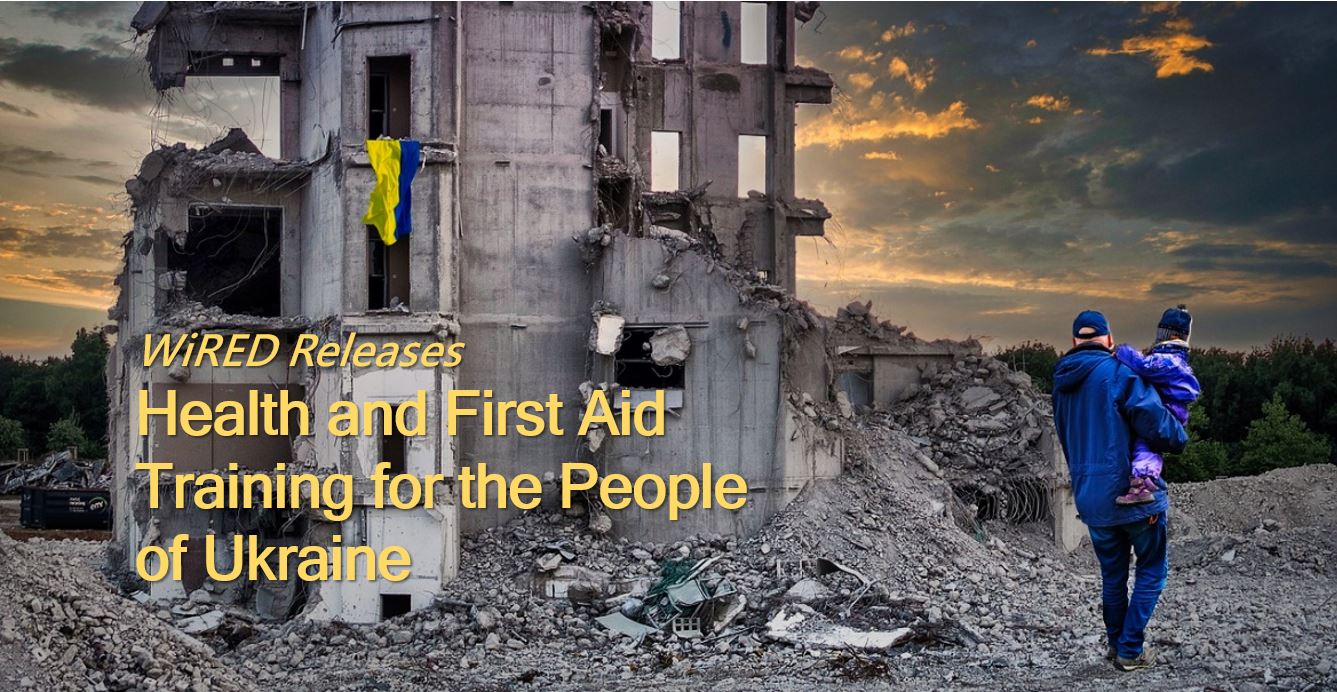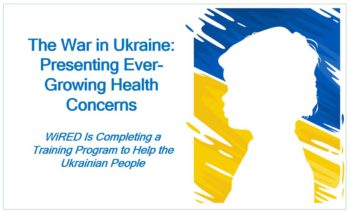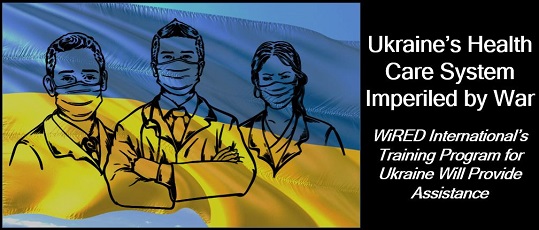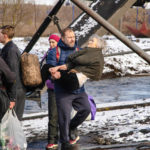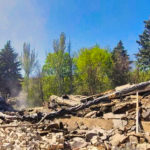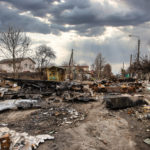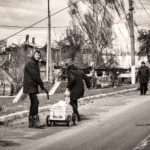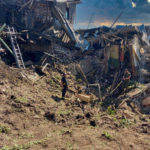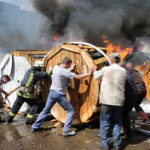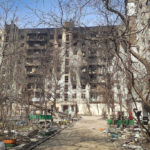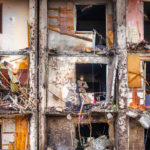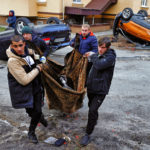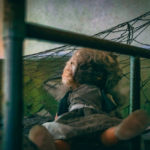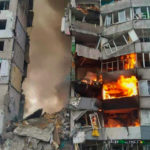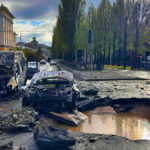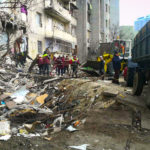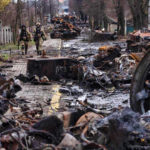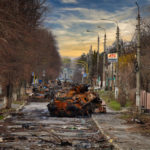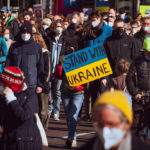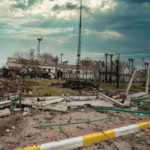Background:
Eight months ago, WiRED’s staff considered how we could assist the Ukrainian people going through a war that has not only affected civilians but has targeted them.
We knew that medical professionals were stretched beyond their capacities, and as a result, ordinary people were called upon to help neighbors injured when a bomb fell. We also knew that the World Health Organization had issued an alarm about the rapid rise in infectious and non-communicable diseases. Crowding, poor diets, shortages of medicines and medical care had increased the health vulnerabilities of Ukraine’s population.
WiRED believed that its community health worker training programs could help the Ukrainian people, and so, in January, we began translating our teaching modules.
Our core health curriculum would help, but the rise in civilian injuries called for additional skills. So, we turned to the U.S. military for guidance on how to structure a first aid critical care training program. We adapted military field manuals along with other resources to create a training bundle for use by ordinary people forced to step in as frontline caregivers.
WiRED’s health and first aid training program is being released this week, free of charge to all people in Ukraine. They can study the interactive modules online or download the program to their phones and tablets for individual or group study. Health and first aid knowledge will help neighbors help neighbors more effectively.
The following article describes the program, the volunteers involved and how Ukrainian people can access the training program. It also offers statements by prominent medical experts attesting to the value of this curriculum.
WiRED Releases Health and First Aid Training Program for Ukraine
WiRED volunteers have just released an extensive community health and first aid critical care training package in the Ukrainian language. The training modules are available for online study and for downloading to smart devices, enabling Ukrainian citizens to learn from the modules even when they face limited internet connectivity.
The program consists of several parts, some of which have been used in recent years to train community health workers in Africa, Latin America and elsewhere. These parts include:
• Core Health Block: This block provides modules on anatomy and physiology, infectious diseases, non-communicable diseases, health promotion and mental health issues.
• Clinical Issues Block (Diagnostics and Key Treatments): This block looks at vital signs, medication management, patient assessment and vision screening.
• Communication Block: This block covers teaching communities about healthy practices and health surveillance, enabling community health workers (CHWs) to monitor communities for early signs of emerging health issues.
• First Aid Critical Care Block: This block offers instruction on first aid and critical care, adapted from a U.S. military medics training curriculum. It includes patient assessment, stop the bleed, shock, CPR, burns, fractures and more, written specifically for people without medical backgrounds.
While the relevance of first aid training needs no explanation in a place where civilians suffer daily assaults, the need to address diseases may be less obvious. That portion of the curriculum is offered in light of the World Health Organization’s reported spike in infectious diseases and non-communicable diseases in Ukraine due to war-imposed crowding conditions, lack of routine medical care, poor diets and restricted opportunity for exercise.
Experts Comment on the Training Program
The WiRED health and first aid training program offers an excellent opportunity for communities throughout Ukraine to learn important life-saving skills. This professionally developed, evidence-based curriculum is designed for people with no medical background. It prepares ordinary people to step in when needed to assist neighbors caught in the violence that burdens this country.
My experience as a U.S. Army Special Forces soldier on the front lines of combat and later as Surgeon General of the United States, has taught me the importance of teaching regular people how to assist others who are injured or sick. This is especially important when doctors and nurses are in short supply, as they are today in Ukraine.
I urge everyone to spend time learning the skills these modules will teach you. Neighborhoods become stronger, and a population becomes more resilient when people have the proficiencies they need to help each other.
—Richard H. Carmona, M.D., M.P.H., FACS, 17th Surgeon General of the United States

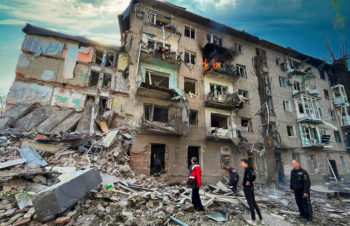
In other countries, this curriculum is offered in an instructor-led classroom setting, but WiRED recognizes that conditions on the ground in Ukraine are sufficiently threatening to open the program to all Ukrainian people for informal study individually or in small neighborhood groups. The formal 200-hour CHW training course generally concludes with a rigorous final examination, the successful completion of which earns the student a certificate of completion. This open program available to Ukrainian citizens for independent study will not offer a final exam or a certificate. However, those wishing to engage in a formal class can do so; WiRED will arrange for instructors in Ukraine and other resources needed for the customary instruction.
The aim of the program is to get this health and first aid training into the hands of as many Ukrainian people as possible, outfitting them with the knowledge they can use to face the brutal assaults on their families, homes and towns.
Emergency response by knowledgeable individuals in the field, specifically for fractures, bleeds and nerve damage can greatly influence the ability of medical professionals to provide positive patient outcomes. WiRED’s First Aid Training Program provides comprehensive, up-to-date, research-based knowledge.
—Robert Ferretti, M.D., former Associate Clinical Professor, UCSF Department of Orthopedic Surgery

As WiRED International releases our Health and First Aid Training for Ukraine, it is worth noting that our organization is no stranger to working in regions of war and conflict all over the world.
The following volunteers have contributed to this project through their efforts to produce, distribute or promote the health and first aid training material. Their work demonstrates the best volunteer spirit.
Frank Butler
Richard Carmona
Eleni Demiridi
Charlotte Ferretti
Elizabeth Fine
Inna Golovakha
Jennifer Halling
Allison Kozicharow
Matt Lang
Carol Leininger
Kateryna Luchina
Taras Lytvyn
Ann Mangold
Miriam Othman
Diana Purucker
Gary Selnow
Chris Spirito
Sameer Verma
Easy access to WiRED’s evidence-based first aid information will be a critical factor in supporting Ukraine’s need to expand humanitarian health care to its refugee population. The program is comprehensive and supported with instruction by health professionals.
—Joan Lunneborg, R.N., M.P.H.
As a public health nurse, I have reviewed WiRED’s health education materials over the years and can attest to the evidence-based material and the learner-focused pedagogy. The curriculum is comprehensive and appropriate for those new to critical responses in emergency situations.
—Carol Essick, R.N., M.S.N.
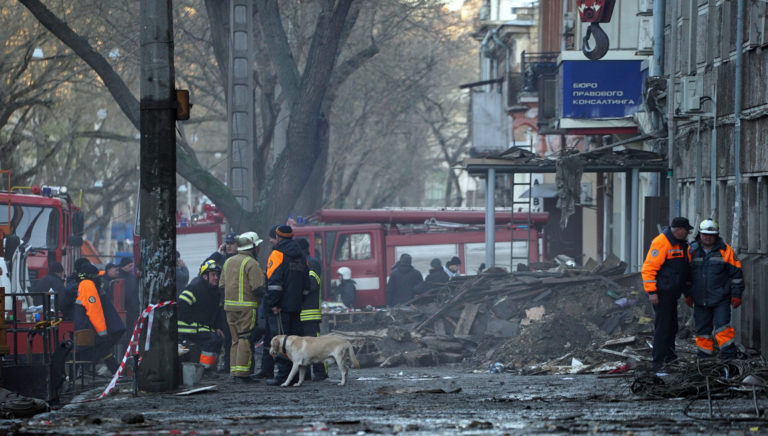
The following statement is offered by Lillian Dajoh, WiRED’s CHW program manager in Kisumu, Kenya. Lillian has been working with WiRED’s health and first aid training program for many years and has seen how the curriculum prepares people with no medical background to serve the health needs of their community.
Our group of community health workers (CHWs) was trained just before the COVID-19 lockdown started in early 2020. We didn’t expect to deploy the group of 20 CHWs so quickly, but our communities needed help as the virus took hold. Conditions created a demand for clinical services and community training in COVID-19 and other disease prevention. Fortunately, we were well trained with the WiRED program, which placed a heavy emphasis on infectious diseases. During the past three years, our health workers have maintained their daily activities, and they have drawn constantly from the training program, not only in infections but also in non-communicable diseases and clinical practices. Further, we rely heavily on the training modules covering health communication and surveillance, skills we use every day.
I can honestly say that the CHW curriculum has prepared us to take on the huge responsibility of providing critical services to our communities. Our deployment program includes regular gatherings for discussions and experience-sharing among ourselves, which strengthens our capacities. We also engage in the continuing medical education program that enables us to brush up on what we have learned and to pick up new skills.
From the perspective of someone who not only has studied the WiRED CHW curriculum, but who has put the lessons into practice for more than three years, I can urge other people who might be in a position to address community health needs to study this material and learn from it. The training format is engaging and informative, and it teaches you really useful and practical information.
—Lillian Dajoh, CHW. Manager of CHW program in Kisumu, Kenya

How to Access WiRED’s Health and First Aid Training Modules
WiRED’s work over the years has brought together the development of health training material with a distribution system for that material. In some urgent situations, we have created a training module and delivered it to the field for use by doctors and community health workers within 24-hours of an outbreak.
We are making available this Ukrainian-language health and first aid critical care training package in two ways:
First, online. People with connectivity will be able to study the interactive modules by going to this Website: https://wiredhealthresources.net/CHW-series-index-Ukrainian.html
Second, for downloading. People will need one-time access to the internet in order to download the entire training package to their devices. How can people do this? Using an Android phone or tablet:
1. Get the free WiRED HealthMAP app at the Google play store
2. After installing the app, go to HealthMAP. Follow the instructions at the top of the Welcome page.
• Click on T (Topics) at the bottom of the app.
• Scroll down to “Ukrainian” at the end of the alphabetized list.
• Click “Ukrainian.” You will see three items: CHW Index; CHW Series Part 1; CHW Series Part 2.
• Download each Part, in turn, by clicking the blue plus box in the upper right corner.![]()
• NOTE: Wait up to a minute–the app will take a little time to prepare the modules for downloading.
• A green downloading progress bar will show the modules downloading.
• Follow these steps for each of the three items (Index, Part 1, Part 2).
• To access the modules:
• At the bottom of the app are four tabs (Home, All, Topics, Library). Click the right tab to view your library, which contains all the modules.
• Click the link to launch that module
![]()
(Note that it will take up to a minute the first time you open a module, as the program assembles the module for you.)
The following stories describe the war’s effects on health conditions and on the medical community in Ukraine.
(click to read these stories)
While editing and reviewing the translations of the WiRED modules, I have become familiar with every line and verse. These online educational modules are a comprehensive, authoritative and effective solution for obtaining practical medical knowledge even in field conditions. I am extremely happy to learn that the modules are available for free to anyone who has a smartphone. That is especially important given the war conditions in Ukraine.
The training material is presented systematically, concisely, and pragmatically. After each theoretical block, the module issues a quiz that reinforces the material and confirms the knowledge level of students. Thanks to this WiRED program, Ukraine will be able to increase the number of people familiar with health and first aid techniques to deal with a growing number of traumatic injuries. I strongly recommend the program for distribution.
—Taras Lytvyn, M.S.
Provided translation reviews of all modules in WiRED’s CHW/FACC program
The San Francisco State University SoN recognizes the Community Health Worker (CHW) curriculum, developed by WiRED International, to offer an excellent, science-based program for CHW training. These WHO-compliant modules, developed by medical professionals and peer reviewed by experts, presents an ideal profile of topics from anatomy and physiology to a rigorous review of infectious diseases, noncommunicable diseases, basic clinical procedures, patient communication, and health surveillance. The addition of the First Aid focus will support community health workers in providing critical onsite emergency care.
—Elaine Musselman, R.N., Ph.D., CNE, Director San Francisco State University School of Nursing
(Thanks to Pixaby, Wiki Commons and other sources of Creative Commons photos of Ukraine used in this story.)
(Special thanks to Wilfried Pohnke for his photo posted at the top of this story.)


